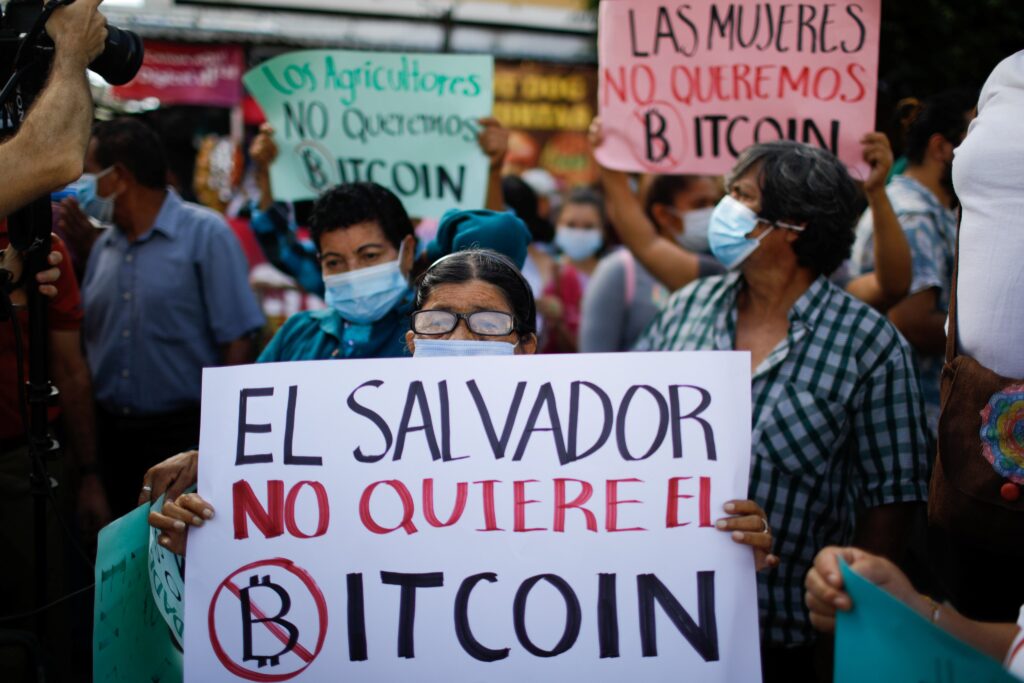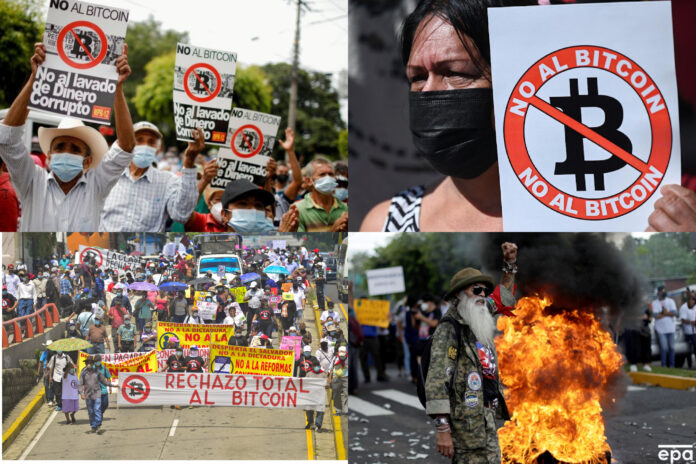El Salvador became the first country in the world to accept Bitcoin as legal tender on Tuesday.
The decision did not go down well with the people of El Salvador. Many citizens of El Salvador are worried over the government’s decision to incorporate Bitcoin as a legal currency in the country.
Salvadorans are also wary of volatility. Bitcoin can shed hundreds of dollars in value in a day.
On Tuesday, Salavadorans marched in El Salvador’s capital to protest the decision. The protest came amidst a faulty initial rollout of systems that will support the cryptocurrency in the country going forward.
More than a thousand people marched in El Salvador's capital to protest the adoption of bitcoin as legal tender, amid a bumpy initial rollout of systems to support the digital currency https://t.co/OBCJ8EjyTl pic.twitter.com/Wl8FA0mALa
— Reuters (@Reuters) September 8, 2021
Protesters burned tyres and set off fireworks in front of the Supreme Court building as the government deployed heavily armed police to the scene.

President Nayib Bukele promoted the approval of the Bitcoin law, which obliges to accept this currency as a form of payment so that Salvadorans living abroad would not have to pay commissions for remittances.
According to the World Bank, remittances made up nearly a quarter of El Salvador’s gross domestic product last year. Bukele claims that switching to Bitcoin, which enables people to send money nearly instantly and nearly for free, can save the nation $400m per year and boost its economy.
Ahead of the launch, El Salvador bought 400 bitcoins worth around $20 million, Bukele said, helping drive the price of the currency above $52,000 for the first time since May. Hours later, bitcoin had weakened and last traded up 0.23% at $46,906.11.

As was expected, the monumental purchase sent the price of Bitcoin soaring in the cryptocurrency market on Tuesday. However, it came down crashing hours later and now hovers around 8 per cent below its price point before El Salvador accepted it as a legal currency.
The event highlighted the concerns of many Salvadorians against cryptocurrency.
Even Bitcoin, the most important of the cryptocurrencies in the world right now, fluctuates rapidly in the market, possibly losing an enormous amount in a very short time if the crypto market goes down. Market activities over the past 24 hours are a glaring example of that.
However, citizens fear that this cryptocurrency will be accepted as the unique form of payment soon given that the Law on Monetary Integration quickly replaced the Salvadoran colon for the U.S. dollar in 2001.
In August, Moody’s and Fitch Ratings downgraded El Salvador’s sovereign debt. Both rating agencies cited the bitcoin law’s steep downside risks and hasty implementation.
Despite this, the Bukele administration pledged to provide US$30 to each citizen in digital tokens through a state-provided digital wallet and begun to install Bitcoin ATMs through which Salvadorans will be able to convert their digital tokens into cash, an initiative backed by a US$150 million government fund.

A 2020 study by Microsoft and the Interamerican Development Bank concluded that El Salvador had the second-lowest internet penetration of 20 countries in Latin America and the Caribbean. At 45%, connectivity was only lower in neighbouring Honduras.
A recent poll by the Universidad Centroamericana José Simeón Cañas, a Jesuit college based in El Salvador, found that 67.9 per cent of the country’s citizens disagreed with the use of Bitcoin as a legal currency. The majority of the respondents did not know how to use the cryptocurrency, the results showed.



























